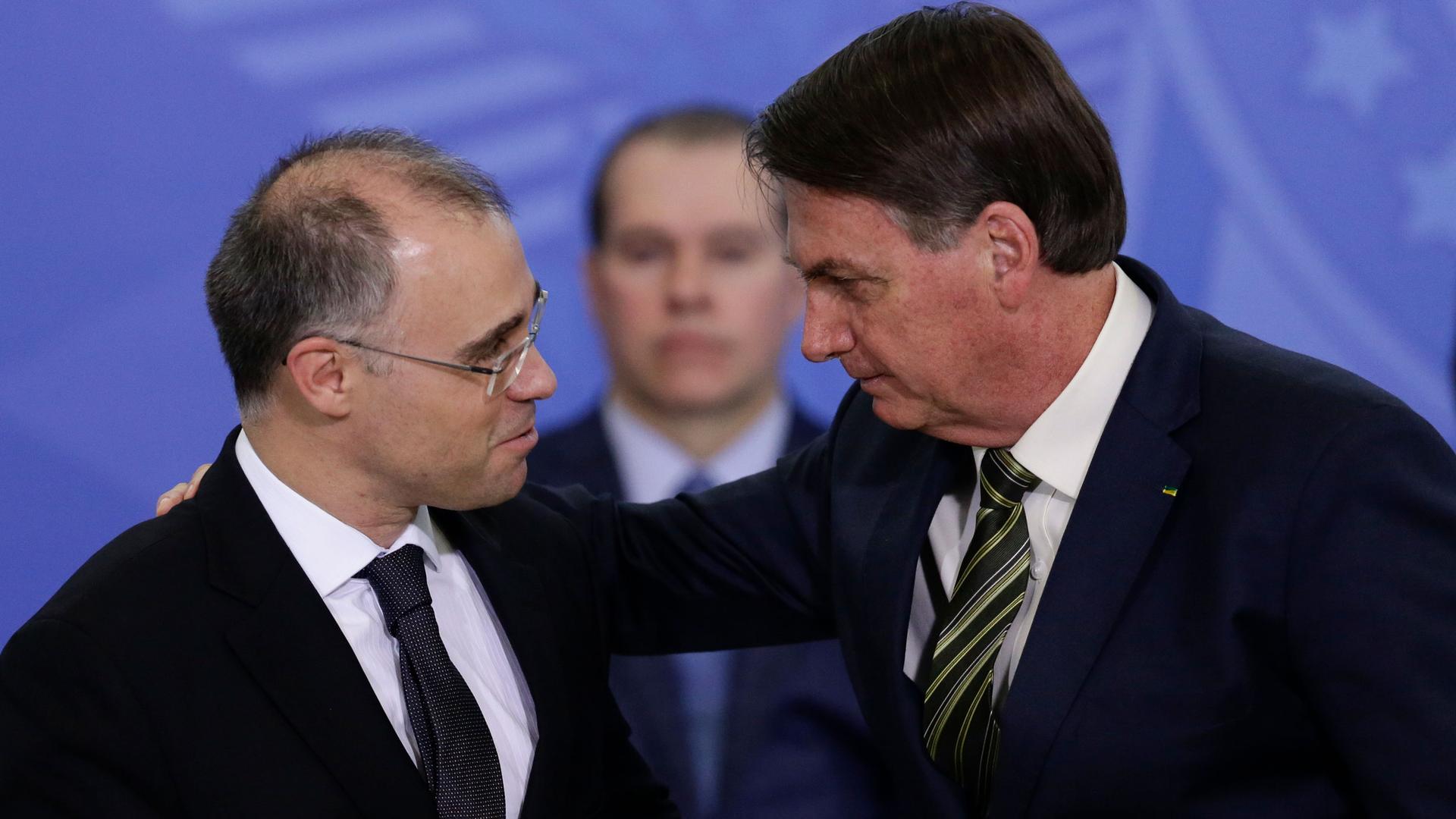Evangelicals in Brazil erupted in celebration last week when the Senate approved a spot on the Supreme Court for André Mendonça, an attorney and evangelical pastor.
Among them was first lady Michelle Bolsonaro.
In a viral video, she jumped up and down, clapping and shouting, “Glory to God.” “Hallelujah,” she cheered, before speaking in tongues and embracing Mendonça beside her.
Mendonça’s approval holds profound significance for evangelicals in Brazil and the Bolsonaro family.
Related: Behind in polls, Bolsonaro bolsters his base with far-right rhetoric from the US
“May God illuminate André in this mission that he has before him,” President Jair Bolsonaro told cameras, while signing Mendonça’s appointment, the day after the Senate confirmation.
Related: Bolsonaro accused of crimes against humanity over negligent COVID response
Mendonça served as Bolsonaro’s justice minister and attorney general, before his appointment to the Supreme Court.
“For the evangelicals — conservative evangelicals — it’s like, ‘we are occupying power.'”
“For the evangelicals — conservative evangelicals — it’s like, ‘we are occupying power,’” said Kenner Terra, a professor of theology and an evangelical pastor in the state of Espírito Santo.
“Now is the time of moral issues and rollbacks in questions related to gay rights, gender issues and social policies. Now the evangelicals have taken power and these things will not have the same space in the country. That’s how they see it,” he said.
“But there is another type of evangelical perspective that understands that the nomination of Mendonça is a risk for the separation between the church and state,” Terra said.
Related: Bolsonaro pulls out all the stops to rally base on Brazil’s Independence Day
During his confirmation hearing, Mendonça said that he had his own roots in faith, but as a Supreme Court justice he’d have to guide himself by the Constitution.
But many fear those two worlds will blur. Shortly after the Senate approval, Mendonça told the press that his appointment was, “one small step for man, one giant leap for evangelicals.”
While acting as attorney general, in April, Mendonça used verses from the Bible to defend the reopening of churches during the pandemic.
“Not to embody any type of prejudice against any type of religiosity, but Mendonça wasn’t appointed to be a justice who is evangelical. He has been appointed to be an evangelical who is a justice and I think that distinction matters,” said Fabio de Sa e Silva, a Brazilian studies professor at the University of Oklahoma.
Caio Fábio, a former evangelical pastor and the ex-president of the Brazilian Evangelical Association, with more than 750,000 YouTube subscribers, expressed concerns about Mendonça’s appointment, “because it’s part of a project of power for the evangelicals.”
“He’s had a short career without anything that would credential him above so many other people who are more qualified. Bolsonaro chose him for his political allegiance.”
“He’s had a short career without anything that would credential him above so many other people who are more qualified. Bolsonaro chose him for his political allegiance.”
In Brazil, the Supreme Court serves roughly the same function as in the United States. Appointees must be a minimum of 35 years old and have had a legal career. Justices are required to retire at age 75.
Brazil is considered the world’s largest Catholic country, but it’s seen a huge rise in the number of evangelicals in recent years. Nearly a third of the country is now evangelical, according to a 2020 Datafolha poll. They are gaining more political power in Congress, in the courts and in Bolsonaro’s government.
Evangelicals voted en masse for Bolsonaro in 2018. Bolsonaro had promised a Supreme Court appointee who was “terribly evangelical.” And he’s made good on that promise.
“I think this was an important accomplishment for Bolsonaro. He is not doing very well in the polls. So, I think it’s a very symbolic and historic event.”
“I think this was an important accomplishment for Bolsonaro. He is not doing very well in the polls. So, I think it’s a very symbolic and historic event,” said Juliano Spyer, a Brazilian anthropologist, whose book, “People of God,” looks at the importance of the rising evangelical population in Brazil.
Not all evangelicals are conservative and not all support Bolsonaro. His approval among evangelicals had dropped to 29% in September, according to Datafolha. But Mendonça’s appointment was a big win for Bolsonaro, as the president hopes to garner support ahead of next year’s elections.
“[Mendonça’s confirmation] was quite important to evangelicals,” Spyer said.
“Bolsonaro will benefit politically from this appointment.”
Mendonça is expected to be sworn in on Dec. 16.
Our coverage reaches millions each week, but only a small fraction of listeners contribute to sustain our program. We still need 224 more people to donate $100 or $10/monthly to unlock our $67,000 match. Will you help us get there today?
